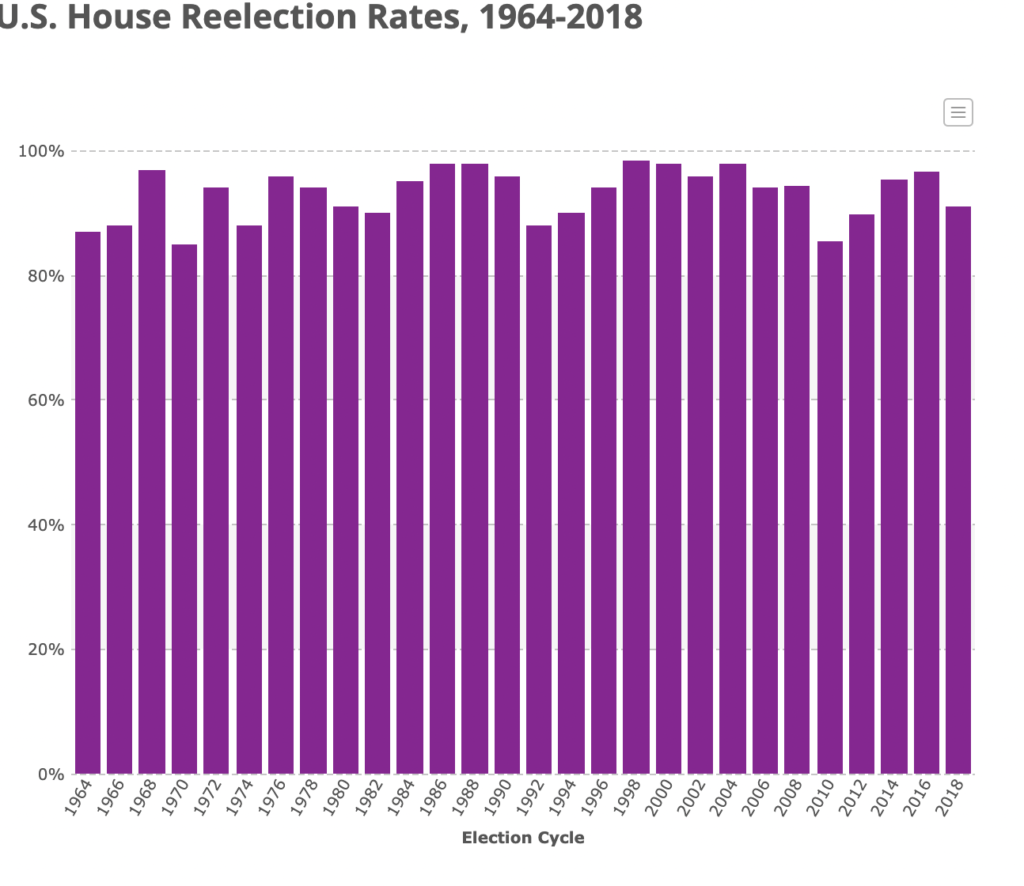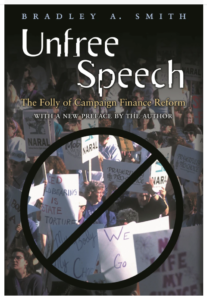Stoa Notes: Term Limits and other Election Law Reforms
Resolved: Election law should be substantially reformed in the United States.
Stoa debaters researching election law reform can review Ballotpedia’s page Elections and campaigns on the ballot for information on:
- Suffrage on the ballot
- Voting policy measures on the ballot
- Campaign finance on the ballot
- Term limits on the ballot
Term limits stand out as an election law reform popular with people (but not so much with politicians) to address the challenge of nearly permanent politicians. Presidents depart every four or eight years, but not Senators and Congressmen.
From Reelection Rates Over the Years (OpenSecrets):

Few things in life are more predictable than the chances of an incumbent member of the U.S. House of Representatives winning reelection. With wide name recognition, and usually an insurmountable advantage in campaign cash, House incumbents typically have little trouble holding onto their seats—as this chart shows.
US Term Limits provides some history of a movement derailed by politicians and the Supreme Court decision in U.S. Term Limits v. Thornton, 514 U.S. 779:
The year was 1995, and the case was U.S. Term Limits v. Thornton. With assistance from USTL, the citizens of 23 states had just passed laws putting term limits on their members of Congress. That meant just under half of all congressmen were term-limited, and Congress would soon be forced to propose a term limits amendment applying to everyone.
But it was not to be. A self-interested politician in Arkansas and his donors made a court challenge to void that state’s law. Others followed. After the Arkansas Supreme Court ruled against us, we took it all the way to the U.S. Supreme Court (SCOTUS).
SCOTUS opined that since the Constitution sets forth the criteria that determines the requirements for Senators and Congressional Representatives, only the Constitution can limit the terms of Congress members.
WHY IS A TERM LIMITS AMENDMENT REQUIRED AND WHAT IS THE PROCESS? (US Term Limits,
US Term Limits further explains:
The Current Stage of the Process
Term limits are a non-partisan issue supported by a whopping 82% of the population. There have been strides in both Congress and by the states towards imposing term limits on Congress.Article V: Proposal by Congress
We believe that the rise of political careerism in modern Washington is a drastic departure from what the founders intended of our federal governing bodies. To effectively ‘drain the swamp,’ we believe it is past time to enact term limits for Congress. ~ Florida Governor and Former Congressman Ron Desantis
Legal Reforms to Improve the Election Process
The political spectrum seems to swing from claims of voter suppression to claims of voter fraud. Many states have long enjoyed transparent election processes (New Hampshire, for example, see The Democrat Fighting H.R.1, WSJ, April 22, 2021)).
Other countries have proven voting procedures that US election reform could learn from. Pew Research’s “FactTank” article From voter registration to mail-in ballots, how do countries around the world run their elections? (October 30, 2020), lists five lessons with #3 of 5:
Before the coronavirus outbreak, about a quarter of countries had used postal ballots in their national elections.
However, Why Do Most Countries Ban Mail-In Ballots?: They Have Seen Massive Vote Fraud Problems (SSRN, December 8, 2020) report:
There are fraud problems with mail-in absentee ballots but the problems with universal mail-in ballots are much more significant. Still most countries ban even absentee ballots for people living in their countries.
Most developed countries ban absentee ballots unless the citizen is living abroad or require Photo-IDs to obtain those ballots. Even higher percentages of European Union or other European countries ban absentee for in country voters. In addition, some countries that allow voting by mail for citizens living the country don’t allow it for everyone. For example, Japan and Poland have limited mail-in voting to those who have special certificates verifying that they are disabled…
France banned absentee voting in 1975 because of massive fraud in Corsica, where postal ballots were stolen or bought and voters cast multiple votes. Mail-in ballots were used to cast the votes of dead people. Examples for other countries are provided.
And the same author, John Lott, in Newsweek Voting Fraud Is a Real Concern. Just Look Around the World | Opinion (August 4, 2020), and Taking another look at election fraud (Washington Times, February 15, 2021). Here is Politico article critical of John Lott.
In the European Union, 63% have put a ban on mailing in ballots except for citizens living overseas. Another 22% have imposed a ban even for those overseas. And most of those that allow mail-in ballots require some form of photo ID to get one, according to the report from the Crime Prevention Research Center
Developed countries ‘ban’ mail-in voting, US would be ‘laughing stock’: Report (Washington Examiner, August 5, 2020)
Apart from claims of voter fraud are questionable changes in voting laws. Op-Ed: PA Supreme Court’s power grab threatens election integrity (Commonwealth Foundation, November 2, 2020) notes:
However, the Court’s most consequential decision — extending the mail-in ballot deadline well after state statute — smacks of partisan politics and preempts the state Legislature’s lawmaking authority. While tasked to interpret and apply the law, five justices instead rewrote the law.
Next in election law challenges are claims of vote harvesting. A lot of people choose not to vote because it seems to them too much trouble, and they don’t take the time to learn about candidates and issues on the ballot. However when advocacy groups offer to help, to collect absentee ballots and deliver them to ballot boxes, that is one step beyond picking up voters and delivering them to polling places (where they can still vote in private).
Ballot harvesting is the process where organized workers or volunteers–people you don’t know–collect absentee ballots from voters and drop them off at a polling place or election office. Nothing can go wrong there; right? …
Orange County, California — which was a Republican stronghold for a long time — had 250,000 harvested ballots turned in on election day. The Republicans have no infrastructure to pursue testing as to how or whether this process was manipulated or fraud was part of the process.
The Stupidity of Ballot Harvesting and How It Steals Elections, (Townhall, February 10, 2019)
The Los Angeles Times ran a story on the vote harvesting process, but good luck finding it via Google! (Google now returns–at least for me–articles on why vote harvesting claims are untrue.)
A valuable resource for proposed election law reforms is the Institute for Free Speech, founded by Bradley Smith who served as a Commissioner on the Federal Election Commission:

A recent New York Times story referred to Smith as the “intellectual powerhouse” of the movement to roll back campaign finance restrictions. His 2001 book, Unfree Speech: The Folly of Campaign Finance Reform, was lauded by George Will as the year’s “most important book on governance.” Princeton University Press page.
A series of LearnLiberty videos features Bradley Smith giving an overview of the history, politics, and economics of campaign finance reform:
• Does Citizens United Protect Your Freedom of Speech?
• What You Probably Haven’t Heard About Citizens United
Debating Election Law reform at Intelligence Squared Debates
Experts on both sides of topic, along with links to resources.
• The Electoral College Has Outlived Its Usefulness (May 20, 2020)
• Individuals and organizations have a constitutional right to unlimited spending on their own political speech (IntelligenceSquaredUS.org, June 26, 2014)
Soho Forum Debates
• Abolish the Electoral College? A Soho Forum Debate (November 18, 2020)
Back to Voter Suppression and/or Voter Fraud
In The Voter Suppression Lie, (Cato Institute, April 22, 2021), Ilya Shapiro notes:
The Washington Post gave Biden “ four Pinocchios” for his claim that SB 202 was “ Jim Crow in the 21st century” for limiting voting hours and otherwise “deny[ing] the right to vote to countless voters.” That paper, not exactly a right‐wing house organ, reported that “experts say the net effect was to expand the opportunities to vote for most Georgians, not limit them.” MIT elections expert Charles Stewart III found that “it indicated an expansion of hours, especially in rural counties.”
• Column: Voter fraud is fake. Voter suppression is real. (Chicago Tribune, November 16, 2020)
From the American Enterprise Institute
• The political right needs to change course on elections reform (February 1, 2021):
The GOP should be looking at all these positive developments and thinking about ways to replicate and expand them. But no. Instead, many Republicans see 2020 as a disaster, and blame fraud — which they failed to prove — and high voter turnout for their defeats. Even worse, they are advocating policies that are all but certain to reduce voter turnout.
From Stossel in the Classroom, Elections:
• Both Sides: Should Everybody Vote? (January 22, 2017)
• How to Become an Informed Voter (October 1, 2016)
• Threats to Free Speech: Silencing Political Opponents (July 28, 2016)
• Everyone Must Vote? (October 9, 2011
George Mason University Economist Bryan Caplan argues just because you can vote, doesn’t mean you should.
Project Sphere
• Project Sphere: What has 2020 taught us about democracy
